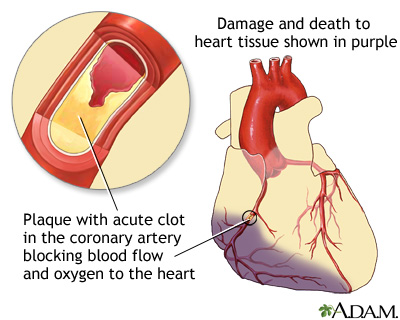Health Library
Heart attack - what to ask your doctor
What to ask your doctor about your heart attack
A heart attack occurs when blood flow to a part of your heart muscle is blocked for a period of time and an area of the heart muscle is damaged. It is also called a myocardial infarction (MI).
Angina is pain or pressure in the chest. It occurs when your heart muscle is not getting enough blood or oxygen. You may feel angina in your neck or jaw. Sometimes you may notice that you are short of breath.
Below are some questions you may want to ask your health care provider to help you take care of yourself after a heart attack.
Images

I Would Like to Learn About:
Questions
What are the signs and symptoms that I am having angina? Will I always have the same symptoms?
- What are the activities that can cause me to have angina?
- How should I treat my chest pain or angina when it happens?
- When should I call the doctor?
- When should I call 911 or the local emergency number?
How much activity is OK for me?
- Can I walk around the house? Is it OK to go up and down stairs? When can I start light housework or cooking? How much can I lift or carry? How much sleep do I need?
- Which activities are better to start with? Are there activities that are not safe for me?
- Is it safe for me to exercise on my own? Should I exercise inside or outside?
- How long and how hard can I exercise?
Do I need to have a stress test? Do I need to go to a cardiac rehabilitation program?
When can I return to work? Are there limits on what I can do at work?
What should I do if I feel sad or very worried about my heart disease?
How can I change the way I live to make my heart healthier?
- What is a heart-healthy diet? Is it OK to ever eat something that is not heart healthy? How can I make heart-healthy choices when I go eat out?
- Is it OK to drink alcohol? How much?
- Is it OK to be around other people who are smoking?
- Is my blood pressure normal?
- What is my cholesterol? Do l need to take medicines for it?
Is it OK to be sexually active? Is it safe to use sildenafil (Viagra), vardenafil (Levitra), or tadalafil (Cialis) for erection problems?
What medicines am I taking to treat angina?
- Do they have any side effects?
- What should I do if I miss a dose?
- Is it ever safe to stop taking any of these medicines on my own?
If I am taking a blood thinner such as aspirin, clopidogrel (Plavix), prasugrel (Effient), ticagrelor (Brilinta), coumadin (Warfarin), apixaban (Eliquis), rivaroxaban (Xeralto), edoxaban (Savaysa), dabigatran (Pradaxa), can I use medicines such as ibuprofen (Advil, Motrin), naproxen (Aleve, Naprosyn) for arthritis, headaches, or other pain problems?
Related Information
Heart attackStable angina
Unstable angina
Tips on how to quit smoking
Heart bypass surgery
Angioplasty and stent placement - carotid artery
Heart bypass surgery - minimally invasive
Heart pacemaker
Angina - discharge
Heart attack - discharge
Angioplasty and stent - heart - discharge
Aspirin and heart disease
Being active after your heart attack
Cardiac catheterization - discharge
Cholesterol and lifestyle
Heart bypass surgery - discharge
Heart bypass surgery - minimally invasive - discharge
Cholesterol - drug treatment
References
Anderson JL, Fang JC. ST segment elevation acute myocardial infarction and complications of myocardial infarction. In: Goldman L, Schafer AI, eds. Goldman-Cecil Medicine. 26th ed. Philadelphia, PA: Elsevier; 2020:chap 64.
Morrow DA, de Lemos JA. Stable ischemic heart disease. In: Zipes DP, Libby P, Bonow RO, Mann DL, Tomaselli GF, Braunwald E, eds. Braunwald's Heart Disease: A Textbook of Cardiovascular Medicine. 11th ed. Philadelphia, PA: Elsevier; 2019:chap 61.
Smith Jr SC, Benjamin EJ, Bonow RO, et al. AHA/ACCF secondary prevention and risk reduction therapy for patients with coronary and other atherosclerotic vascular disease: 2011 update: a guideline from the American Heart Association and American College of Cardiology Foundation endorsed by the World Heart Federation and the Preventive Cardiovascular Nurses Association. J Am Coll Cardiol. 2011;58(23):2432-2446. PMID: 22055990 pubmed.ncbi.nlm.nih.gov/22055990/.
BACK TO TOPReview Date: 3/15/2021
Reviewed By: Thomas S. Metkus, MD, Assistant Professor of Medicine and Surgery, Johns Hopkins University School of Medicine, Baltimore, MD. Also reviewed by David Zieve, MD, MHA, Medical Director, Brenda Conaway, Editorial Director, and the A.D.A.M. Editorial team.
 | A.D.A.M., Inc. is accredited by URAC, for Health Content Provider (www.urac.org). URAC's accreditation program is an independent audit to verify that A.D.A.M. follows rigorous standards of quality and accountability. A.D.A.M. is among the first to achieve this important distinction for online health information and services. Learn more about A.D.A.M.'s editorial policy, editorial process and privacy policy. A.D.A.M. is also a founding member of Hi-Ethics. This site complies with the HONcode standard for trustworthy health information: verify here. |
The information provided herein should not be used during any medical emergency or for the diagnosis or treatment of any medical condition. A licensed medical professional should be consulted for diagnosis and treatment of any and all medical conditions. Links to other sites are provided for information only -- they do not constitute endorsements of those other sites. © 1997- 2021 A.D.A.M., a business unit of Ebix, Inc. Any duplication or distribution of the information contained herein is strictly prohibited.
